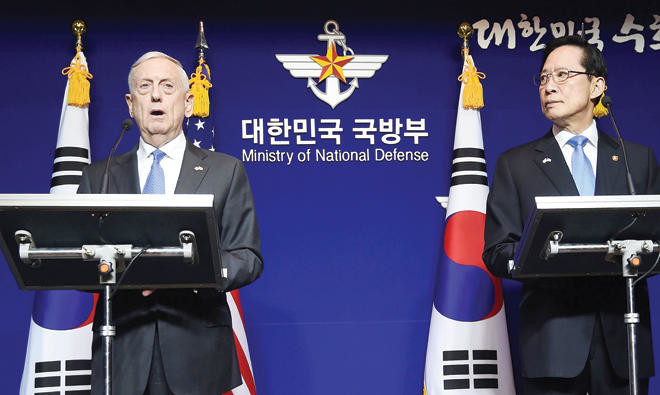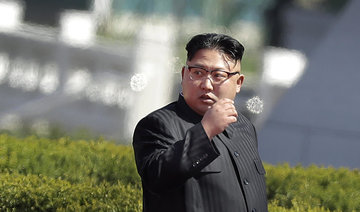SEOUL: The threat of nuclear missile attack by North Korea is accelerating, US Defense Secretary Jim Mattis said Saturday, accusing the North of illegal and unnecessary missile and nuclear programs and pledging to repel any strike.
In remarks in Seoul with South Korean Defense Minister Song Young-moo at his side, Mattis said North Korea engages in “outlaw” behavior and that the US will never accept a nuclear North.
The Pentagon chief added that regardless of what the North might try, it is overmatched by the firepower and cohesiveness of the decades-old US-South Korean alliance.
“North Korea has accelerated the threat that it poses to its neighbors and the world through its illegal and unnecessary missile and nuclear weapons programs,” he said, adding that US-South Korean military and diplomatic collaboration thus has taken on “a new urgency.”
“I cannot imagine a condition under which the United States would accept North Korea as a nuclear power,” Mattis said.
As he emphasized throughout his weeklong Asia trip, which included stops in Thailand and the Philippines, Mattis said diplomacy remains the preferred way to deal with the North.
“With that said,” he added, “make no mistake — any attack on the United States or our allies will be defeated, and any use of nuclear weapons by the North will be met with a massive military response that is effective and overwhelming.”
Mattis’ comments did not go beyond his recent statements of concern about North Korea, although he appeared to inject a stronger note about the urgency of resolving the crisis.
While he accused the North of “outlaw” behavior, he did not mention that President Donald Trump has ratcheted up his own rhetoric. In August, Trump warned the North not to make any more threats against the US, and said that if it did, it would be met with “fire and fury like the world has never seen.”
Song said at the news conference that he and Mattis agreed to further cooperation on strengthening Seoul’s defense capabilities, including lifting warhead payload limits on South Korean conventional missiles and supporting the country’s acquisition of “most advanced military assets.” He offered no specifics and refused to answer when asked whether the discussions included nuclear-powered submarines.
Some South Korean government officials have endorsed the nation getting nuclear-powered submarines amid calls for more military strength. There is a growing concern among the South Korean public that North Korea’s expanding nuclear weapons arsenal, which may soon include an intercontinental ballistic missile that could target the US mainland, would undermine Seoul’s long alliance with Washington.
South Korea’s conservative politicians have also called for the United States to bring back tactical nuclear weapons that were withdrawn from the Korean Peninsula in the 1990s. But Mattis and Song were strongly dismissive of the idea.
“When considering national interest, it’s much better not to deploy them,” said Song, adding that the allies would have “sufficient means” to respond to a North Korean nuclear attack even without placing tactical nuclear weapons in the South. Mattis said current US strategic assets are already providing nuclear deterrence and that the South Korean government has never approached him with the subject of tactical nuclear weapons.
Trump entered office declaring his commitment to solving the North Korea problem, asserting that he would succeed where his predecessors had failed. His administration has sought to increase pressure on Pyongyang through UN Security Council sanctions and other diplomatic efforts, but the North has not budged from its goal of building a full-fledged nuclear arsenal, including missiles capable of striking the US mainland.
If Trump sticks to his pledge to stop the North from being able to threaten the US with a nuclear attack, something will have to give — either a negotiated tempering of the North’s ambitions or a US acceptance of the North as a nuclear power.
The other alternative would be US military action to attempt to neutralize or eliminate the North’s nuclear assets — a move fraught with risk for South Korea, Japan and the US.
Mattis touched off unease in South Korea last month when he told reporters at the Pentagon that the US has military options for North Korea that does not put Seoul at risk. At Saturday’s briefing, Mattis did not offer a direct answer to what those options are or how and when they would be used.
“Our military options as I mentioned are designed to buttress the diplomats’ efforts to maintain a deterrence stance and denuclearize the Korean Peninsula,” he said. While the allies are committed to deterring North Korea, they also need “many different military options that would realistically reduce that threat as low as possible,” Mattis said.
“And yes, we do have those options,” he said.
Pentagon chief says North Korea engages in ‘outlaw’ behavior
Pentagon chief says North Korea engages in ‘outlaw’ behavior

Tobacco-like warning label for social media sought by US surgeon general who asks Congress to act

- Dr. Vivek Murthy said that social media is a contributing factor in the mental health crisis among young people
WASHINGTON DC: The US surgeon general has called on Congress to require warning labels on social media platforms similar to those now mandatory on cigarette boxes.
In a Monday opinion piece in the The New York Times, Dr. Vivek Murthy said that social media is a contributing factor in the mental health crisis among young people.
“It is time to require a surgeon general’s warning label on social media platforms, stating that social media is associated with significant mental health harms for adolescents. A surgeon general’s warning label, which requires congressional action, would regularly remind parents and adolescents that social media has not been proved safe,” Murthy said. “Evidence from tobacco studies show that warning labels can increase awareness and change behavior.”
Murthy said that the use of just a warning label wouldn’t make social media safe for young people, but would be a part of the steps needed.
Social media use is prevalent among young people, with up to 95 percent of youth ages 13 to 17 saying that they use a social media platform, and more than a third saying that they use social media “almost constantly,” according to 2022 data from the Pew Research Center.
“Social media today is like tobacco decades ago: It’s a product whose business model depends on addicting kids. And as with cigarettes, a surgeon general’s warning label is a critical step toward mitigating the threat to children,” Josh Golin, executive director at Fairplay, an organization that is dedicated to ending marketing to children, said in a statement.
Last year Murthy warned that there wasn’t enough evidence to show that social media is safe for children and teens. He said at the time that policymakers needed to address the harms of social media the same way they regulate things like car seats, baby formula, medication and other products children use.
To comply with federal regulation, social media companies already ban kids under 13 from signing up for their platforms — but children have been shown to easily get around the bans, both with and without their parents’ consent.
Other measures social platforms have taken to address concerns about children’s mental health can also be easily circumvented. For instance, TikTok introduced a default 60-minute time limit for users under 18. But once the limit is reached, minors can simply enter a passcode to keep watching.
Murthy believes the impact of social media on young people should be a more pressing concern.
“Why is it that we have failed to respond to the harms of social media when they are no less urgent or widespread than those posed by unsafe cars, planes or food? These harms are not a failure of willpower and parenting; they are the consequence of unleashing powerful technology without adequate safety measures, transparency or accountability,” he wrote.
In January the CEOs of Meta, TikTok, X and other social media companies went before the Senate Judiciary Committee to testify as parents worry that they’re not doing enough to protect young people. The executives touted existing safety tools on their platforms and the work they’ve done with nonprofits and law enforcement to protect minors.
Murthy said Monday that Congress needs to implement legislation that will protect young people from online harassment, abuse and exploitation and from exposure to extreme violence and sexual content.
“The measures should prevent platforms from collecting sensitive data from children and should restrict the use of features like push notifications, autoplay and infinite scroll, which prey on developing brains and contribute to excessive use,” Murthy wrote.
Sens. Marsha Blackburn and Richard Blumenthal supported Murthy’s message Monday.
“We are pleased that the Surgeon General — America’s top doctor — continues to bring attention to the harmful impact that social media has on our children,” the senators said in a prepared statement.
The surgeon general is also recommending that companies be required to share all their data on health effects with independent scientists and the public, which they currently don’t do, and allow independent safety audits.
Murthy said schools and parents also need to participate in providing phone-free times and that doctors, nurses and other clinicians should help guide families toward safer practices.
While Murthy pushes for more to be done about social media in the United States, the European Union enacted groundbreaking new digital rules last year. The Digital Services Act is part of a suite of tech-focused regulations crafted by the 27-nation bloc — long a global leader in cracking down on tech giants.
The DSA is designed to keep users safe online and make it much harder to spread content that’s either illegal, like hate speech or child sexual abuse, or violates a platform’s terms of service. It also looks to protect citizens’ fundamental rights such as privacy and free speech.
Officials have warned tech companies that violations could bring fines worth up to 6 percent of their global revenue — which could amount to billions — or even a ban from the EU.
US-UK forces launch strikes on Yemen’s Hodeidah and Kamaran Island: Houthi-run Al Masirah TV

CAIRO: Al-Masirah TV, the main television news outlet run by Yemen’s Houthi movement, said on Monday that US and British forces have carried out at least six airstrikes on Yemen’s Hodeidah International airport and four strikes on Kamaran Island near the port of Salif off the Red Sea.
More to follow...
Saudi interior ministry arrests six violators of Hajj regulations

- Those arrested were given 15-day prison sentence and fined SR10,000 for each violator they tried to transport
- The vehicles used to transport the violators were confiscated
RIYADH: Hajj security forces stationed at entrances to Makkah arrested on Sunday six people who violated Hajj regulations by transporting a group of 52 individuals attempting to perform Hajj without a permit.
The resident and five citizens were each given a 15-day prison sentence and fined SR10,000 ($2,665) for each violator they tried to transport illegally.
The vehicles used to transport the violators were also confiscated, the Ministry of Interior said.
Residents who violate Hajj regulations face deportation and the ministry has urged all citizens and residents to strictly comply with Hajj regulations to ensure pilgrims feel safe, comfortable, and at peace when performing Hajj rituals.
44.8m phone calls by pilgrims during Eid

- 38.04 million were local and 6.76 million were international calls, with a success rate of more than 99 percent
- In terms of data usage, pilgrims consumed 5,790 terabytes during the holiday
MINA: Pilgrims in Makkah and at the holy sites made a record-breaking 44.8 million telephone calls on Sunday during Eid Al-Adha, Saudi Arabia’s Communications, Space and Technology Commission said on Monday.
Of those, 38.04 million were local and 6.76 million were international calls, with a success rate of more than 99 percent.
In terms of data usage, pilgrims consumed 5,790 terabytes during the holiday, the commission added, which is equivalent to streaming more than 2.37 million hours of high-definition, 1080p video.
Average daily data consumption reached 779.93 megabytes per subscriber, which was more than double the global average of 380MB.
The mobile internet infrastructure was able to provide an average data-download speed of 376.18 megabits per second and an average upload speed of 48.04Mbps, according to the commission.
India and US to address barriers to trade and cooperation

The commitment was made at a meeting between the national security advisers of the two countries, Ajit Doval and Jake Sullivan, during Sullivan’s two-day visit to New Delhi.
The US and India are forging deeper strategic ties, with mutual concerns about an ascendant China in the Indo-Pacific region, even though India has maintained its close relationship with Russia despite its invasion of Ukraine in 2022.
Sullivan and his Indian counterpart chaired the second meeting of the India-US initiative on Critical and Emerging Technology, which they launched in January 2023.
Without naming any country, a joint fact sheet of the meeting shared by the Indian government said Sullivan and Doval “resolved to prevent the leakage of sensitive and dual-use technologies to countries of concern.”
They also launched a new strategic semiconductor partnership between US and Indian companies for precision-guided ammunition and other national security-focused electronics platforms, it said.
They also agreed to co-invest in a lithium resource project in South America and a rare earths deposit in Africa “to diversify critical mineral supply chain” and committed to soon conclude a bilateral critical minerals pact for graphite, gallium and germanium.
Last year, during Modi’s state visit to Washington, India had announced buying 31 MQ-9B drones from General Atomic, and the two countries had started discussions to jointly produce General Electric’s fighter jet engines by Hindustan Aeronautics in India, which is yet to be finalized.
Sullivan and Doval also discussed possible co-production of land warfare systems.
The visit is the first by a high-ranking US official since Prime Minister Narendra Modi returned to office with the help of allies as his party failed to win a majority.
Modi met US President Joe Biden on the sidelines of the G7 Summit in Italy last week. Sullivan met Modi and Foreign Minister Subrahmanyam Jaishankar earlier in the day.
The relationship between Washington and New Delhi has been tested after the US accused Indian government agents of plotting to murder a Sikh separatist leader on US soil last year, after Canada made similar allegations. India dismissed the Canadian accusations, but initiated an investigation into the US allegations.
The US has extradited an Indian national from the Czech Republic, whom it has indicted for the foiled assassination plot.
There have also been some concerns raised about the treatment of minorities in India.






















